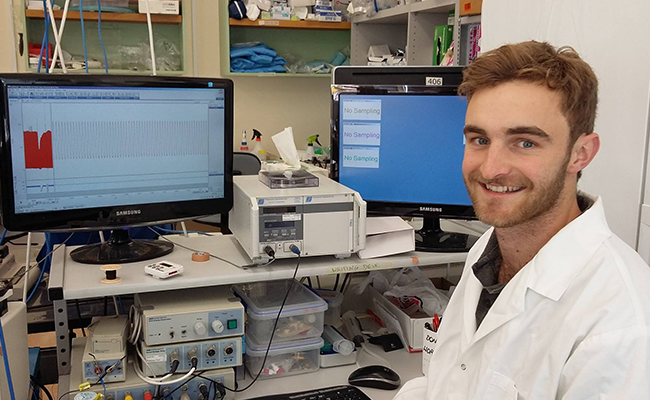Tuesday 10 May 2022 2:33pm
 Hamish Aitken-Buck
Hamish Aitken-Buck
Hamish Aitken-Buck graduates this month with a PhD in Physiology as well as many other accolades that give testimony to his successes at the School of Biomedical Sciences.
Based in the Department of Physiology, Hamish has received commendations for almost every year he has been at the University.
These include the Eccles Prize in 2016, the James Robinson Prize in 2017 and first-class Honours in his Bachelor of Physiology in 2018.
From there, he won the Mary Bullivant Oral Presentation Prize in 2019, the John Hubbard Memorial Prize from the Physiological Society of New Zealand for his excellence in PhD in 2021, and a three-year Heart Foundation Research Fellow Scholarship in 2021.
One of his supervisors, Associate Professor Regis Lamberts, shared that even with the disruptions caused by COVID-19, Hamish also managed to complete his PhD in only three years and author several academic papers.
“Hamish has been very successful during his time at University, winning many awards whilst also producing 12 publications and has been first author in eight of those,” Associate Professor Lamberts says.
“This is an exceptional achievement, especially given that two of those years were influenced by COVID-19, and goes to show what an exceptional achiever Hamish has been during his years at the University,
“As his previous supervisor and current mentor, I might be a bit biased, but there are very few students like Hamish around.”
Hamish shares that he was grateful for the support given to him by his supervisors, Associate Professors Regis Lamberts and Pete Jones, and that it was his interest in heart physiology that pushed him towards postgraduate research in the first place.
“Throughout my PhD I was lucky enough to have supervisors that encourage their students to pursue the publication and presentation of their work,” Hamish says.
He says a highlight was being part of the highly productive research environment with the HeartOtago research collaboration.
“This support gave me the tools I needed to really focus on my PhD research, which explored two components of fat metabolism and obesity that have been associated with heart disease and abnormal heart rhythms,” Hamish says.
“The first component focused on the structure of fat cells within the layer of fat surrounding the heart and how their structure changes in obesity. We found that these fat cells are unique among fat cell populations in that they don’t tend to change in size as an individual’s body size increases.
“The second component investigated the effects of particular fat metabolites on the behaviour of human cardiac muscle, and we found that families of fat metabolites that are found at higher levels in the blood of patients with abnormal heart rhythms can directly alter the strength and rhythm of heart contractions.”
Hamish hopes that, by exploring how fat regions change in obesity and how molecular products of fat digestion impair heart function, the insights gained from his PhD research can help fill key gaps in improve the quality of life and health outcomes for those living with obesity and heart disease.
Hamish would recommend postgraduate study to anyone who likes to problem solve, think critically, and “balance working independently while being part of a team”.
“My undergraduate and postgraduate study experiences at Otago have been invaluable for me both personally and professionally,” Hamish says.
“The experience I’ve gained and the connections I’ve made continue to help me to advance my scientific career.”
